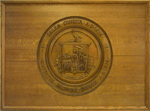Stearns House: Difference between revisions
No edit summary |
No edit summary |
||
| Line 1: | Line 1: | ||
The Stearns House (aka East India House) is located at 384 Essex Street and was erected in 1776. Built during the Revolution, these | The Stearns House (aka East India House) is located at 384 Essex Street and was erected in 1776. Built during the Revolution, these | ||
houses represent a transitional stage of architecture, rather than a distinct type of square house. They were | houses represent a transitional stage of architecture, rather than a distinct type of square house. They were | ||
forerunners of the hip roof. The exterior of the Stearns house is notable chiefly for the handsome Doric porch | forerunners of the hip roof. The exterior of the Stearns house is notable chiefly for the handsome Doric porch | ||
added by McIntire in 1785. This was the residence of Major, afterward, Colonel Joseph Sprague, who was related by | added by McIntire in 1785. This was the residence of Major, afterward, Colonel Joseph Sprague, who was related by | ||
marriage to the Stearns family. | marriage to the Stearns family. | ||
Colonel Sprague, then a major, participated in the first armed resistance to the British at the incident known | Colonel Sprague, then a major, participated in the first armed resistance to the British at the incident known | ||
as [[Leslie's retreat]] on Sunday Feb. 26, 1775. | as [[Leslie's retreat]] on Sunday Feb. 26, 1775. | ||
It was sometimes referred to as the East India House. According to the report by Historic Salem Inc., | |||
"It was run as an Inn and a Tea Room during the following period and was so named, according to Mr. James Ballou, because of their grandfather who had many artifacts of .. the East India trade period" | |||
[[Category:Browse Index]] | [[Category:Browse Index]] | ||
Revision as of 11:31, 5 May 2021
The Stearns House (aka East India House) is located at 384 Essex Street and was erected in 1776. Built during the Revolution, these
houses represent a transitional stage of architecture, rather than a distinct type of square house. They were
forerunners of the hip roof. The exterior of the Stearns house is notable chiefly for the handsome Doric porch
added by McIntire in 1785. This was the residence of Major, afterward, Colonel Joseph Sprague, who was related by
marriage to the Stearns family.
Colonel Sprague, then a major, participated in the first armed resistance to the British at the incident known
as Leslie's retreat on Sunday Feb. 26, 1775.
It was sometimes referred to as the East India House. According to the report by Historic Salem Inc., "It was run as an Inn and a Tea Room during the following period and was so named, according to Mr. James Ballou, because of their grandfather who had many artifacts of .. the East India trade period"
See Also
- Colonial Architecture of Salem by F. Cousins, p. 58 (photo), 62-63, 108, p. 117-118
